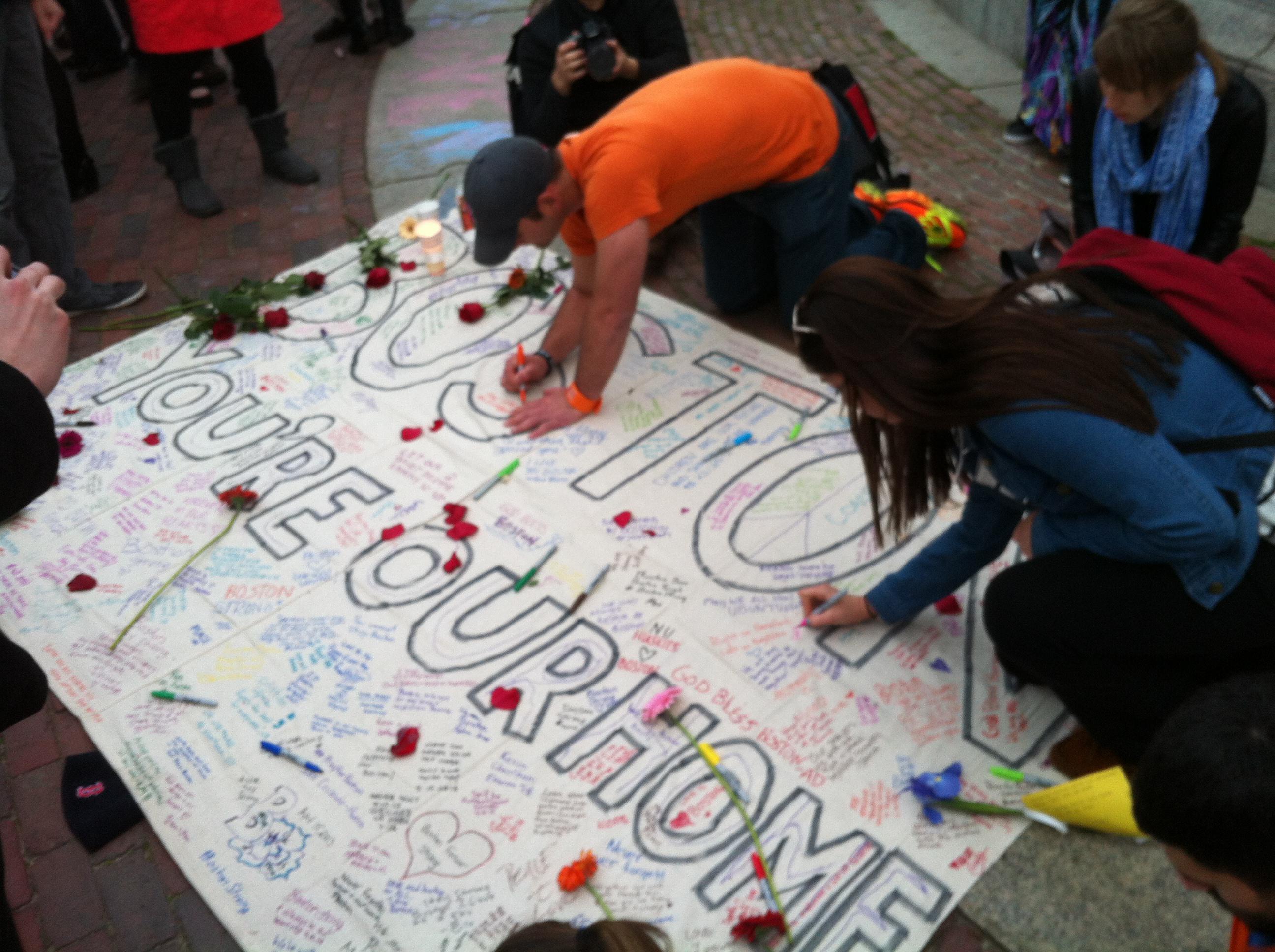Crime is Slate’s crime blog. Like us on Facebook, and follow us on Twitter @slatecrime.
At 12:30 this afternoon, about 10 people gathered in the Church of the Covenant, on the corner of Newbury and Berkeley streets, for an impromptu prayer service. A minister who resembles the actor Bill Pullman reads from Psalm 46, which counsels faith in God in times of trouble, altering the verses to bring the larger message home. “God is in the midst of the city; it shall not be moved,” he says. “God is in the midst of Boston; it shall not be moved.” He lights three candles for the three confirmed victms—8-year-old Martin Richard and two others who, at that point, had not yet been named—and then cedes the lectern to the cantor, who sings an ethereal a cappella version of the hymn Dona Nobis Pacem, which translates to “Grant Us Peace.”
One day after two bombs exploded near the finish line of the Boston Marathon, the city is subdued but hardly peaceful. Streets are still cordoned off, as part of an ongoing crime scene. Police and military personnel crowd the ones that aren’t. In this atmosphere, every loud noise feels like another disaster, and every swarm of police brings a tiny flush of panic. Late this afternoon, the tourist attraction Faneuil Hall was cleared of people and surrounded by police. “I’m standing here, aren’t I?” one cop responded when asked whether the area was safe. The response didn’t inspire much confidence. But, then, confidence is in short supply.
It’s not that the city has shut down. It hasn’t. This isn’t Sandy Hook, a town so small that every resident seemed to have a personal connection to that tragedy. The shooting there was so horrific that it required your full attention just to process what had happened. Time stopped in Sandy Hook in the days after the shooting, daily life abandoned in a groundswell of grief.
Boston, however, is a big city. From the North End to Kenmore Square, people are going shopping, going to work, going for jogs down Commonwealth Avenue. People are talking about the weather, the Red Sox, the price of gasoline. It’s a city full of strangers, and many of those strangers, who have come here from far away, are wearing blue and yellow marathon warmup jackets as they try to make the most of what remains of their vacation. I even got a parking ticket this morning. Life goes on.
But it goes on differently. Television camera trucks crowd the streets and median strips. A horde of major network news teams clusters near the corner of Boylston and Arlington, at the entrance to the Public Garden, their cameras turned toward the blast site. Marathoners go in and out of the Park Plaza Castle to retrieve their belongings and get some free ice cream. Outside the building, reporters line the sidewalk, vying for interviews.
A man wearing a marathon sweatshirt shuffles down Washington Street in the Downtown Crossing area, wearing a bandage under his nose, using an old broom handle for a cane. “I’m dying of brain cancer. I can’t run anymore,” he notes when asked whether he was in the race yesterday. His wife did run, however, and he was standing near the finish line waiting for her when the bombs went off. “I saw the whole thing. There was a big boom. Then another boom.”
Another woman, from Costa Rica, was heading toward the finish line on an MBTA train when the train was evacuated. “In the middle of all the chaos, all the fear, I thought, ‘All I can do is pray,’ ” she remembered. To that end, she has taped a sign to her bag, reading “Need Prayer? We are here. #prayforboston.” Has anyone asked her for a prayer? “No. I think people are too shy.”
People here are shy. People here are reserved. People here aren’t asking complete strangers for prayers. (This is Boston, after all.) But people are coming together, driven by a sense of shared trauma. “May we reach out, look into a stranger’s eyes, and smile,” the minister at the Church of the Covenant prayer service said this afternoon. “May we seek embrace, may we seek solidarity and community.”
In the early evening, hundreds of people gather near the rotunda in Boston Common for a nonsectarian candlelight vigil. A sign reading “Peace Here and Everywhere” hangs from the rotunda; on the ground, there are big paper banners reading “Boston, You’re Our Home” and, again, “Peace Here and Everywhere.” Attendees use colored markers to inscribe their own messages—asserting the city’s resilience, counseling love, pleading for unity.
The night is crisp, breezy, the cloudy sky mottled with pink. A group of young people circle up and sing songs that everybody knows; the crowd sings along, holding candles with small cups around the wicks, shielding the flames from the wind. They sing “Lean on Me,” “This Land is Your Land,” and the national anthem. As darkness descends, they switch to a less familiar song. Dona Nobis Pacem. Grant us peace.
Read more on Slate about the Boston Marathon bombing.
